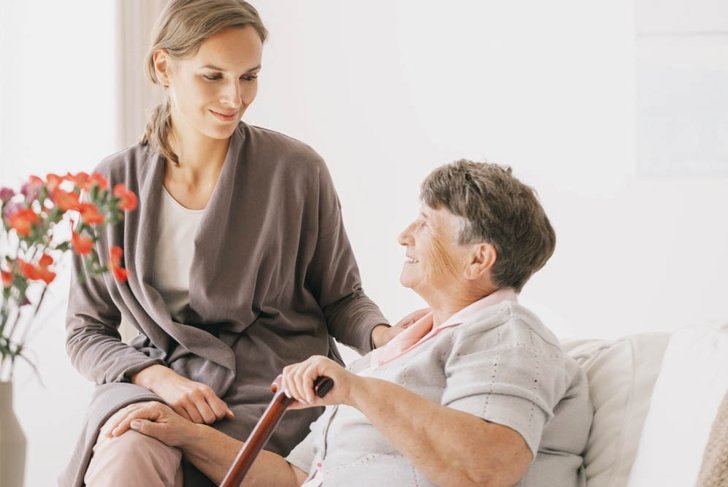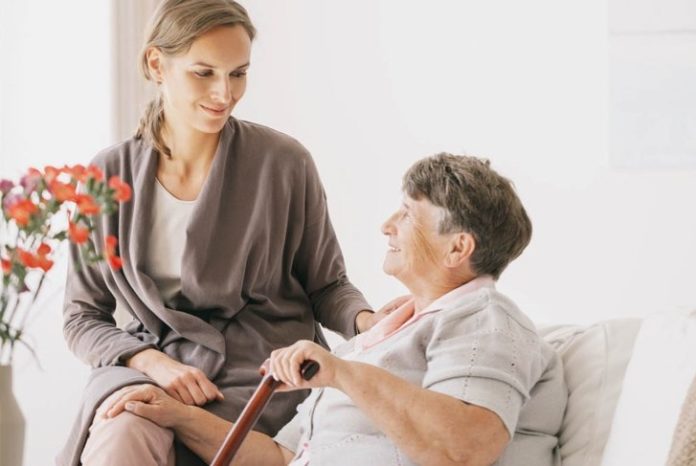
If the recent health care environment has taught us anything, it’s that our health system relies heavily on home caregiving for those who are sick and dying. And while there are benefits to home care for both the carers and the patient, the arrangement can take its toll. Without adequate support, caregivers can experience burnout or compassion fatigue—but it doesn’t have to be that way.
Caregiving is multifaceted
As its name implies, caregiver burden results from the demands on the care provider, up to and including burnout. Burnout refers to a state of emotional, mental, and physical exhaustion and may lead to anxiety, depression, fatigue, and stress.
On the positive end of the spectrum, caregiving is associated with improved well-being, personal growth, a sense of fulfillment, and feeling good about caring for another person. Together, these positive effects of caregiving are known as compassion satisfaction.
Compassion fatigue is a holistic concept that originated in the field of nursing and includes both the negative and positive aspects of caregiving. Compassion fatigue occurs when the amount of compassion overwhelms the ability to cope or recover. Not surprisingly, compassion fatigue occurs in informal caregivers, too.
Signs of compassion fatigue
- apathy
- fatigue
- irritability
- decreased productivity
- boredom
- emotional overwhelm
- poor judgment
- desensitization to others’ needs
Gendered expectations for caring
The cultural expectations that women take care of private matters in the home means that women feel morally obligated to assume the caregiver role in families. Despite increasing numbers of men who are caregivers, statistics show that women still provide the majority of care in homes. Women are more likely to spend 20 or more hours per week on caregiving tasks, while men were more likely to spend less than an hour per week providing care to another.
Women are also more likely to provide time-sensitive personal care involving bathing, toileting, dressing, and medical treatments, while men are more likely to perform chores such as yard work that can be put off until a convenient time.
In other words, immediate demands of those who receive care must be incorporated into a potentially full roster of activities for women, including employment. Caregiving responsibilities can lead to lost workdays, forgoing job opportunities, and reduced work hours that may affect employee health benefits.
As a result, well-being can suffer for women providing care. Research showed that women reported higher levels of burnout and secondary traumatic stress than do men. (Secondary traumatic stress refers to stress that occurs from witnessing someone else’s trauma.) Particularly in the emotional and time-limited end-of-life period, women often neglect their own needs to take care of the well-being of a dying friend or relative.
By the numbers
Caregivers providing care to loved ones:
With age-related conditions 28%
With cancer 11%
With cardiovascular disease 9%
With mental illness 7%
For parents 48%
For over one year 89%
Average hours per month 16 to 28
Care for yourself
Caregiving can quickly become all-consuming. From the outset, it’s important to have strategies in place to support your own well-being. (You won’t be able to care for anyone if you collapse from exhaustion because you don’t sleep, or you get sick because you neglected your diet.)
Reach out for help
If you are in a caregiving role, remember that you don’t have to do it all, all by yourself. Nor do you have to do it all perfectly.
- Learn how to delegate and to accept your personal limits.
- Practise saying no to requests that you know someone else can easily handle.
- Call on family, friends, and spiritual or religious groups who might be interested in helping.
- Reach out to specific disability, illness, palliative care organizations, or respite services for support.
Caregiver’s tool kit
Stress is inevitable, but some nutrients are shown to help your body manage its effects.
Vitamin B6 may help reduce anxiety in older women.
Vitamin C may help reduce anxiety and slow increases in blood pressure that result from stress.
Ashwagandha, in recent research, was found to reduce the stress hormone cortisol by 25 percent in women who took 240 mg of a standardized ashwagandha extract.
GABA, the main inhibitory neurotransmitter in the brain, which helps bring on slumber, may help decrease how long it takes to fall asleep and boost total snooze time when it’s taken together with L-theanine (from tea).
Be sure to build breaks into your day, even if it means sipping on your anxiety-soothing camomile tea outside for five minutes!





















